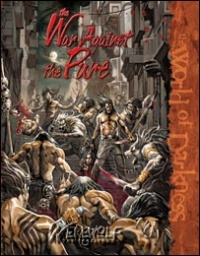Wolf Pack
From Edge of Darkness Wiki
 War Against the Pure p. 44 | |
| Preq's |
Dexterity ●●● Stamina ●● Brawl Skill ●●● Primal Urge ● |
|---|---|
| Level(s) |
● (2XP) ●● (6XP) ●●● (12XP) ●●●● (20XP) |
| Venue | Werewolf |
| Possessed By | |
Your character has learned the art of fighting as a wolf in a pack, with an emphasis in wearing down the prey, tripping and setting up your packmates to deliver decisive strikes.
The Uratha developed this style of fighting Uratha long ago. It is based upon the principles of pack fighting and surges in popularity at times when packs must take on mightier foes. (The reclamation of the Rocky Mountain region saw some packs practicing this fighting style.) Not surprisingly, this fighting style grows more potent based on the number of packmembers who practice it.
Fighting Style: Wolfpack can be used in Urshul and Urhan forms. Untrained Uratha can attempt some of these maneuvers at the Storyteller’s option, but only when in Urhan or Urshul forms, and they suffer a –2 dice penalty to all dice pools.
Contents |
Worry (●)
Wolves are experts at distracting foes. This combat maneuver may take the form of feints, extremely loud yelps or false retreats to allow one’s packmates to maneuver into better positions for attack. This counts as an attack action. The effect of Worrying is that a single Uratha counts as two opponents when figuring a target’s Defense. For example, a magath with a Defense of 4 is being attacked by two Uratha. One Worries the target. When calculating the monster’s Defense for the second attacker, the Storyteller applies a – 2 dice penalty instead of –1.
Experienced Uratha can often see through this ruse and may reflexively make a Primal Urge roll. Each success cancels the extra benefits of Worrying for a single attacker, on a one-to-one basis. Note: It does not change the base modifier for fighting multiple foes, just the advantage of Worrying.
Trip/Bowl-Over (●●)
The object of these maneuvers is to knock over the opponent. A Trip is trying to destabilize the opponent by either pushing or pulling him and must be executed as an overpowering grappling maneuver — meaning the aggressor must already have achieved a hold. In this case, a Trip is a contested Strength (or Dexterity, if higher) + Brawl roll. If the attacker wins, he renders his opponent prone without going prone himself and is considered to have broken the hold. A tie means that both contestants fall and become prone; when the target wins, he escapes the hold.
A Bowl-Over is trying to use the attacker’s mass and momentum to knock the target off balance. An Uratha executes a Bowl-Over by moving up to twice the character’s speed, and at some time passing beside the target, clipping its legs. This maneuver is a full action and requires a Strength + Brawl roll; the difference between the attacker’s and the target’s Sizes becomes a bonus or penalty to the roll. For each point by which the attacker is larger or smaller, add or subtract one die.
Four-footed animals add two dice to resist Trip or Bowl-Over maneuvers. Should the maneuver succeed, remember that an attacker gets a +2 dice bonus to hit a prone target in close combat.
Slow the Prey (●●●)
The werewolf targets an opponent’s legs rather than his vitals — especially the juicy hamstrings. She suffers a –2 dice penalty to her attack roll, but every point of damage done also lowers the opponent’s speed by 1. Prey suffering these effects may spend a Willpower point to ignore the movement penalty for a round. Hindrance from Slow the Prey disappears once the damage done by this maneuver heals.
Joint Attack (●●●●)
Your character can take advantage of the distraction and effort inherent in fending off someone else’s attack to slip through the target’s defenses. By delaying his initiative to one when an ally is making an attack (regardless of who actually acts first based on compared Dexterity + Composure and roll- offs), your character can make a Joint Attack. Each ally attacking the same target on the same initiative reduces the combined penalty the character suffers from Defense and Armor by one. Only a character with Joint Attack gains this benefit, but an entire pack of werewolves all with Joint Attack can all benefit from mobbing a single target.
‘’’Drawback:’’’ At least one werewolf with Joint Attack must spend one Willpower point so that all characters with the Merit may benefit from the tactic. Note that this Willpower expenditure does not add three dice to the attack.
|
| |||||||||||||||||
| Character Type | Werewolf + |
| Merit Dots | 1 +, 2 +, 3 +, and 4 + |
| Merit Type | Physical + |
| Page has default formThis property is a special property in this wiki. | Merit Editor + |
| Parent | War Against the Pure +, and Fighting Styles + |
| Permission | Allowed + |
| Pool | Brawl Skill +, Strength +, and Dexterity + |
| Prerequisite | Dexterity +, Stamina +, Brawl Skill +, and Primal Urge + |
| Source | War Against the Pure + |